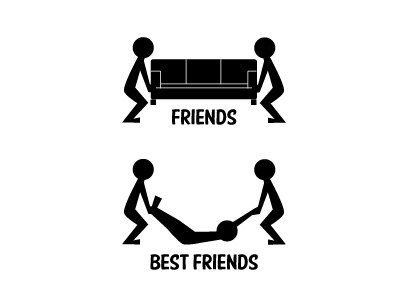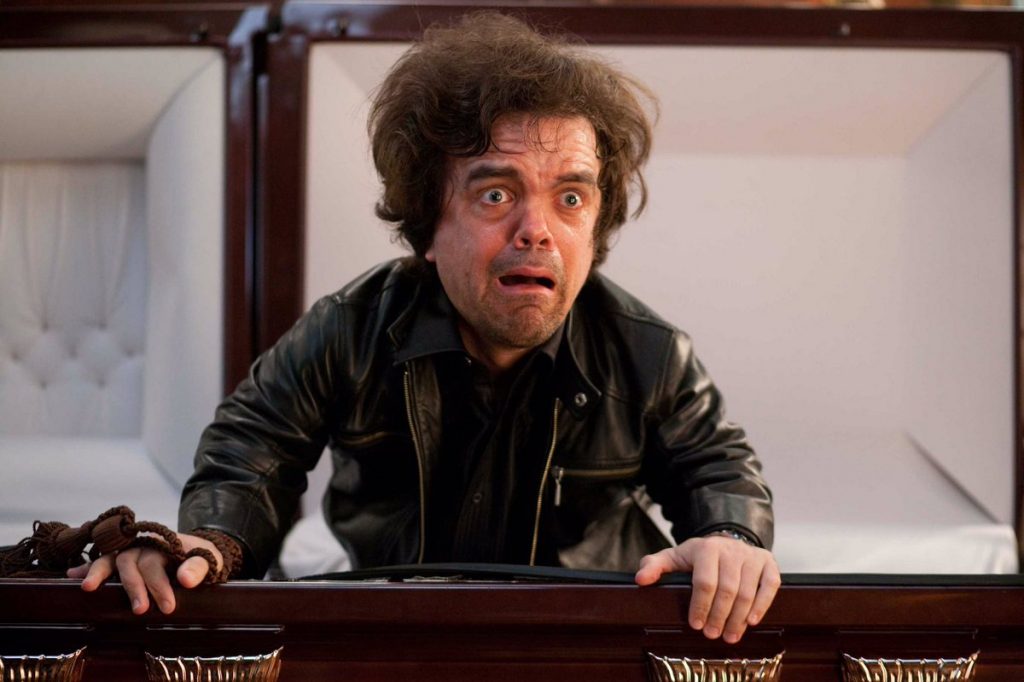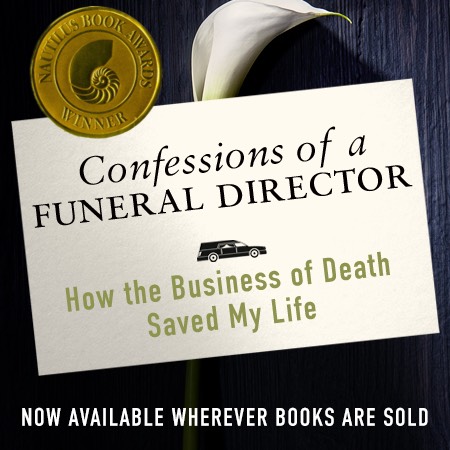Caleb Wilde
(218 comments, 980 posts)
Posts by Caleb Wilde
“Will You Help Me Pick Up a Body?”

This is a question I’ve had to ask a few of my friends ever once upon a busy day at the funeral home.
House removals are different than hospital and nursing home removals. “House calls” as we call them often involves obstacles (like stairs, furniture, dogs etc.) that one person cannot overcome alone.
While hospital and nursing home removals usually only require ONE person to make the removal, house calls require TWO (sometimes more depending on the place of death and the size of the deceased).
There’s three of us at the funeral home who are capable of making house removals. When one out of those three is on vacation, leaving two behind, things can get sticky. Every once upon a busy day when we are picking up more bodies than our personnel can handle, I’ll have to randomly call in some back up … which usually ends of being one of my buddies.
Last year I called two separate friends on two separate occasions.
When I called both of them, I gave them this line:
“Do you want to make $150 dollars for an hour’s worth of work?”
“Sure!”, they said.
And when I told them HOW that $150 was to be made, both were still willing. After telling them what to wear, how the whole procedure would work and what they should expect, they both did a wonderful job. In fact, on one occasion, we arrived at the home of the deceased and the family fed us pizza. I paid my buddy $150 and he got free pizza too. Good deal.
This past Friday I was in the too-many-calls-with-too-little-personnel situation. Both of the friends I had called before were on vacation, so I called up another friend.
“Do you want to make $150 for an hours worth of work?”
“Sure”, he said. And then he asked, “Do I have to touch a dead body?”
“Yes.”, I said.
“Then $150 isn’t enough. I don’t want to touch a dead person.”, he stated.
I totally understood his position, told him I’d hold this over him forever and was able to find someone else who was willing to touch the dead.
So, how much would I have to pay you to help me go on a house call?
*****
If you like my writing, consider buying my 2017 Nautilus Book Award Gold Winner, Confession of a Funeral Director (click the image to go to the Amazon page):
Death Fact: Part 1

Apparently, this is true. She woke up, was surrounded by sobbing friends and relatives, and started screaming because she didn’t want to be buried alive. Some reports state that she died of shock, which is when your body produces a surge of adrenaline that stuns the heart.
This type of death-by-intense-fear is sometimes called a “Voodoo Death.” There’s a number of psychosomatic causes of death similar to “Voodoo Death”, such as the Broken Heart Syndrome.
Obviously, she wasn’t embalmed. You don’t come back from THAT! Her blood pressure must have been nondetectable, so her skin would have been cold and felt “dead” without the normal blood distribution. That “dead” feeling explains why those who dressed her and put her in the casket wouldn’t have noticed she was slightly warmer than a normal corpse.
The husband said he planned to sue the hospital. I can’t find anything about said lawsuit (maybe it was settled outside of court), but I hope he received some compensation. Not that money makes things better, but winning a settlement usually means the hospital acknowledges a mistake. And that acknowledge can mean something.
Some of the Mistakes I’ve Made as a Funeral Director

Funeral directing can be a lot like parenting.
If you have just one kid, you can usually keep the chaos at bay. When there are two kids, life can get hectic real quick. When there are three kids or more? The six-month-old is crying because he’s hungry, your three-year-old has magically found the fragile wine glass you had left out the night before, and when you ask your six-year-old for help, he starts to sass you because “he was right in the middle of his game.” All that happens in the span of a minute while you’re trying to cook dinner. For those of us that know the chaos, it’s not “can I stop the chaos”, it’s “how much can I limit the chaos?”
Mistakes happen. The three-year-old drops the glass, you drop the egg that you were about to crack for the quiche, and your six-year-old slams down the PS4 controller in protest, while you trip over the six-month-old and cut your knee on remanents of your broken stemware.
Running funerals are the same (without the quiche and the wine … although wine at funerals isn’t an awful idea). You have one funeral going, and it’s fairly simple. You can give your undivided time to just that one family. But all of a sudden, two more people die and now you have three funerals that you’re juggling, doing your best to maintain a semblance of order.
At this point, mistakes can happen. You do your best to create checklists and accountability measures. You do your best to overcommunicate the small details, but sometimes mistakes still happen
“Well, why don’t you just hire more staff? When you have too many kids, you get some help.” Oh, sage-of-the-internet-who-assumes-everyone-has-less-intelligence, let me answer that by saying this: things can get so busy all at once (which is the weird and unpredictable nature of this business) that it’s like going from one child to 10 children in a matter of hours. One minute you have too many staff at the funeral home, and the next minute you’re short staffed.
I met with a family the other week who instructed me to place a specific t-shirt at the foot of their husband’s casket during the public viewing. The day I was supposed to dress him, I got sick (I get semi-yearly days of utter brain fog that supposedly results from my Lyme’s Disease), leaving my grandfather to do my work.
In my sickened state, I forgot to tell Pop-pop to put the t-shirt at the foot of the casket. He put the t-shirt on the deceased.
I pulled myself out of bed for the funeral the following day, and when I saw what had happened, my heart sank. I apologized profusely to the family. They forgave me. That was a couple weeks ago and I’m still upset about it all.
But shit happens in life and shit happens in death.
Have you misspelled words in an email? I’ve misspelled words in an obituary.
Have you dropped a cup of coffee before? When I first started, I had a loaded stretcher collapse on me in the middle of a parking lot.
Have you ever confused your kids and put one to sleep in the wrong bed? Funeral directors might put a body in the wrong casket.
Have you ever thrown something in a fire, only to have that thing explode and cause 10K worth of damage? Well, I’ve missed a pacemaker or two in my career and reaped the consequences.
Maybe you’ve had a random collapsible stretcher loaded with a dead body and you were trying to get it into the bed of a van at a nursing home and it just wouldn’t collapse … and you tried and tried and a crowd started to gather as they watched you struggle to get the loaded stretcher into a van, and you just couldn’t and you almost started crying, and then after five minutes of trying to get it in the van you realized you were pulling the wrong leaver and you were almost at the point where you just wanted to crawl in the back of the van with the dead person and be dead too?
No? Just me.
As a parent, I realize my mistakes. I learn from them. I correct them if I can. And I tell my kids when I’m wrong. I don’t act like a know-it-all around my kids. I don’t give them the impression I’m a saint.
It’s hard for funeral directors to be honest with their mistakes because the whole process of putting a funeral together is SO EMOTIONALLY CHARGED. It’s not like I gave you Quarter Pounder instead of the Big Mac that you wanted. I can correct that mistake. We get one shot to do everything right. A mispelled name in an obituary can cause a firestorm. A pacemaker exploding in a retort can cost $10,000. Combing the hair the wrong way on the deceased can incite a flood of tears in the family. Everything needs to be done right.
But let me tell you from experience, it’s so much easier to be honest with your mistakes than it is to put together an elaborate lie or blame it on someone else. As tempting as it is to make excuses, I’ve learned that mistakes are human and apologies cultivate our humanity.
Love you all 🙂
P.S. If you’re feeling brave, I’d love to hear about your mistakes as well!
*****
If you like my writing, consider buying my 2017 Nautilus Book Award Gold Winner, Confession of a Funeral Director (click the image to go to the Amazon page):
Alua is an end of life planner and death doula
“Part of the reason (we don’t like talking about death) is that death brings every part of who we are as humans into very sharp focus. And something like that can be overwhelming to consider. When I’m thinking about my death, I’m thinking about my identity. I’m thinking about what I’ve accomplished. I’m thinking about who I’ve loved. I’m thinking about sex. I’m thinking about what I eat. I think about my body. I’m thinking about my work. I’m thinking about all parts of me because me as I know it will cease to exist at that point.” — Alua Arthur
If you have a few seconds, please go “like” Alua’s “Going with Grace” Facebook page by clicking HERE.
Although Alua is based in Los Angeles, her death doula and end of life services are available to anyone, no matter their location.
Enjoy the conversation:
What a funeral director would say to someone who’s suicidal

If you’re suicidal, here is some perspective from a funeral director:
In the nearly 15 years I’ve been working in the funeral business, I’ve seen around 60 plus suicide victims. I’ve seen the hangings. I’ve seen the intentional ODs. The suicide cocktails. I’ve seen the carbon monoxide deal. I’ve seen the shotgun to the head (and, seriously, guys, don’t do it this way … no funeral director wants to show a shotgun face to your mother). There have been some creative ones as well, like slamming the car into tractor trailers (another bad idea), or listening to Nickelback for 48 hours on end (I kid).
Somewhat unlike police, coroners, or anyone else involved in the forensic side of death by suicide, funeral directors usually hear the personal story behind the suicide. Many times the family is still piecing together the puzzle of “why”, but they involve us in the puzzle. They tell us about the deceased’s life, what was going on, the hardships, the possible reasons. We’re in a unique position in that we not only see the physical result of the suicide, but we also hear the personal side as well.
The majority of suicides (I’d estimate 70% of the ones I’ve seen) are some type of “break-up suicide” (this can involve a romantic breakup that’s either your fault or your partner’s fault; a break-up having to do with a job [the firing kind]; or a sudden break-up of your identity).
Approximately 20% are from the exhaustive battle with mental illness.
The remaining 10% are those who are suffering from a physical illness and don’t want to continue with their pain (that 10 % is a demographic that I’ve addressed before … suffice it to say, if you’re terminal and you don’t want to prolong the inevitable, you should have the legal right to do so).
BREAK-UP SUICIDES
Most (certainly not all) break-up suicides are men … usually young men.
Let me speak to the men for a minute before I move on. Men struggle to cry at funerals. I’ve seen men get angry, but cry? Sometimes. And if they do, they try to hide it like something’s wrong with it. We’ve been taught that it’s not masculine to express our feelings unless those feelings are anger (and then it’s somehow okay). When we feel grief, or rejection, or worthlessness, depression, or real guilt we have absolutely little idea how to deal with it. I’m sorry that we live in a culture of toxic masculinity. But we do. And these emotions — as strong as they are now, and as impossible as they are right now — are apart of you as a human being, and they’re okay. Because as a human being, you’re capable of crying, of feeling worthless, of rejection, depression, and asking forgiveness, and coming out on the other side with your identity intact. If you’re feeling these things, you’re not “less of a man.” Because even though you may feel emasculated, your identity is NOT based on your penis, it’s based on your humanity.
Okay, let’s switch back to chatting with everyone thinking about “break-up suicide” (because this is a human problem, not just a man problem):
These are usually the messy ones. The one’s funeral directors hate from a technical basis. The shot-gun to the head kind. Often while drunk. Because for most of the “break-up suicides” your mind is feeling utterly overwhelmed and the emotions are so strong, so difficult that you don’t always think. You feel trapped. You feel like there’s no moving forward. No tomorrow. Because you feel like that one thing your identity was tied to … that thing that meant so much to you has either cheated on you, rejected you, or shit on you or vice versa.
I want to remind you of this: your life doesn’t exist in the vacuum of your relationship with your partner, or your work, or your perceived identity. There are options and there are other people who love you!!!
Even if you don’t see their love or feel it at this moment. YOU ARE LOVED. AND, if you really don’t think anyone loves you, I do. So there. But, you can’t come and live at my house unless you provide ample supplies of pizza and tacos.
You know all this. You know people love you. It’s probably the only thing that’s keeping you alive. It might be the reason you’ve stumbled upon this article about suicide written by a funeral director.
I’m not trying to add guilt, but let me recount my experience with those that are left behind:
I’ve held back a mother’s hair as she wept over the body of her son. I’ve grabbed a mother under her arms to keep her from falling. I’ve seen the blank stares of utter disbelief from children. I’ve watched a spouse crumble to his knees.
I’ve heard the cries:
“Why couldn’t I heal my baby’s heart?”
“Didn’t he know how much I loved him?”
“Why didn’t he just talk to me?”
“I’m so sorry … I didn’t know I hurt you this much!”
“I forgive you … it wasn’t this bad … it was never this bad!”
“Can I still call myself a ‘mother’?”
“If only it could be me instead.”
“What happened to daddy?”
“Get up, mommy. Get up.”
You get it. It hurts your parents, it hurts your kids, it hurts your partner. It even hurts your animals (do you have a plan for where your animal will go once it loses you?).
There’s a saying that goes something like this: “Suicide doesn’t end the pain, it just passes it on to someone else.” The saying isn’t entirely true (it’s unfair in some respects), but it certainly can be true.
Here’s what I’d say to you: IF YOU’VE JUST GONE THROUGH AN INTENSE BREAK-UP OF ANY KIND, AND YOU’RE THINKING ABOUT SUICIDE … TALK TO SOMEONE!!! Out of all the cries I’ve heard over “break-up suicides”, that’s the one I’ve heard the most: WHY DIDN’T HE/SHE JUST TALK TO ME? Talk to someone. They might be busy. Hell, they might be sleeping. But they’d rather talk to you now than weep over your body at my funeral home.
DEATH BY MENTAL ILLNESS
The second largest “suicide group” that I’ve dealt with at the funeral home are those who have experienced death by mental illness. I’m not a clinical psychologist, a clinical social worker, or a licensed professional counselor. I’m going to share my experiences with the families of those who have died from mental illness.
I have seen a couple of families who knew that their loved one’s mental illness was almost a terminal illness. They cast no shame towards their loved one. There was no condemnation. In fact, some of these families talk about how brave their loved one was. How she fought her mental illness for year and years and overcame so many obstacles. How she fought for them, for love. The suicide wasn’t a failure. She just recognized that enough is enough. And there was a degree of peace, knowing the fight was over.
You’re not giving up, you’ve probably just had enough.
You’re not stupid.
You’ve tried, and tried, and tried … more than is humanly possible. You have done your absolute best. You’ve fought as hard as you could for your loved ones.
You’re not selfish for wanting to end your pain.
You’re not a failure. You don’t call a kangaroo a failure if it can’t jump to the moon. If your pain is unstoppable, you’re not a failure for feeling it or responding to it.
Nobody grows up and has hopes and dreams of ending their life. We all want to live. We all want something wonderful in life: love, trust, friendship, commitment, dreams, hopes, pizza, tacos.
This isn’t something you want. It’s the lesser of two evils. Stopping your pain is better than letting it continue.
From the experiences I’ve had, there are two things that I think about you: you’re incredibly brave and incredibly selfless.
Can I offer some hope without shame? I’ve noticed something else about death by mental illness (which is a phrase I like better than the word “suicide”), most of these deaths tend to be in their mid-thirties to mid-fifties. Here’s my thought from that observation: there are some people who have made it through. Not because they were stronger, or more selfless. Not because “it got easier”. And maybe not because their lives got better (but I hope their lives did get better). Maybe they made it through that 20 plus years of mental illness hell because they found better companions for their journey. I don’t know. Really, I don’t. All I know is that I have no recollection of someone who died from mental illness in their sixties, seventies or eighties. And I’m hoping that the explanation for my observation is because it gets somewhat better.
HERE’S THE MAIN THING: No matter what your choice, do yourself a favor and find someone, anyone who listens and can hear you. You deserve to be heard. Your story needs to be told. Whether it’s a shrink or a random friend from decades ago that’s just a damn good listener. Tell your story before you go. Because I’ve heard those stories from your family and friends who shared about your fight. I need your story. You are the beauty of humanity.
*****
If you like my writing, consider buying my 2017 Nautilus Book Award Gold Winner, Confession of a Funeral Director (click the image to go to the Amazon page):

